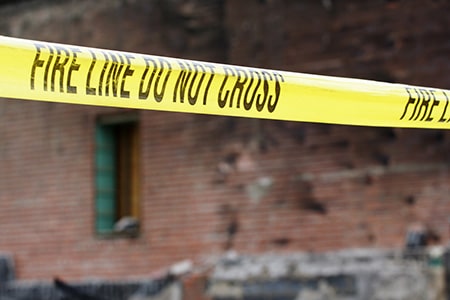Arson Investigator Careers and Education
If you’re up for a fiery challenge, this specialized fire science career may be for you.

Arson and fire investigators often begin their careers in law enforcement and eventually move on to this more specialized field.
Working as an arson or fire investigator can be challenging and dangerous, but identifying arsonists or ensuring a building’s safety can be very fulfilling.
Here’s what you’ll do in each of these rigorous careers and the background you’ll need—and education you’ll complete—to work in these forensics subfields.
Arson and Fire Investigator Responsibilities
Arson Investigator:
Arson investigators are responsible for determining who started the fire and acquiring evidence that will lead to the arrest and prosecution of the suspect. They often testify in court as expert witnesses regarding the techniques used to gather the evidence against the accused.
Arson investigators also work to determine the cause and origin of the fire in many agencies; however this overlaps with much of what a fire investigator’s job description is.
Arson investigators work in both the private and public sectors.
Fire Investigator:
Fire investigators have an in-depth understanding of fire behavior and working knowledge of building construction and engineering.
To excel as a fire investigator, you’ll need to be able to:
- Have knowledge of types of fuel, the ease of ignition of each fuel, and the impact of each fuel on the development of a fire
- Collect, secure, package, and transport physical evidence
- Document fire scenes through the use of photography
The evidence that fire investigators collect may be used in the prosecution of an individual responsible for an intentionally set fire and can often times testify as expert witnesses at trial.
Fire investigators work for insurance companies and other private fire investigation firms. They may also be employed by public agencies like the ATF and police or fire departments.
Education and Certification Requirements
Many arson and fire investigators who start off in law enforcement and gain investigation experience begin to specialize in fire and arson investigation by taking courses in these areas. Earning a criminal justice degree is often a requirement and can help you gain some of the necessary skills and knowledge.
Other relevant degrees include:
- Fire science
- Engineering
- Science
- Chemistry
Other investigators attend academies or schools that offer programs in fire science and investigation. The ATF, for example, has a special training academy for their fire investigators and arson investigators but does require a bachelor’s degree as well.
Certificate and/or courses that are relevant to pursuing a career in fire investigation might include topics such as fire dynamics, incendiary fire, motor vehicle fire investigation, insurance, fire investigation, and other related topics.
Certification
Certification for arson investigators is offered through the International Association of Arson Investigators (IAAI) and termed the IAAI-CFI. Certification through the National Association of Fire Investigators (NAFI) is done through the National Certification Board and offers certification in:
- Fire and explosion investigation
- Certified fire investigation instructor
- Certified vehicle fire investigator
Arson Investigator Salary and Job Outlook
According to the U.S. Bureau of Labor Statistics’ 2023 Occupational Employment Statistics, the median annual salary for fire inspectors and investigators is $74,160. Actual salaries may vary greatly based on specialization within the field, location, years of experience, and a variety of other factors. National long-term projections of employment growth may not reflect local and/or short-term economic or job conditions and do not guarantee actual job growth.
Employment is predicted to grow 3.7% through 2032, which is as fast as average for all occupations. Many fire and arson investigators recommend volunteering in your local fire department while earning your degree. Volunteering can sometimes help you in your future job search.
